Elijah at the Proms was a little too tasteful – plus the best of July’s classical concerts
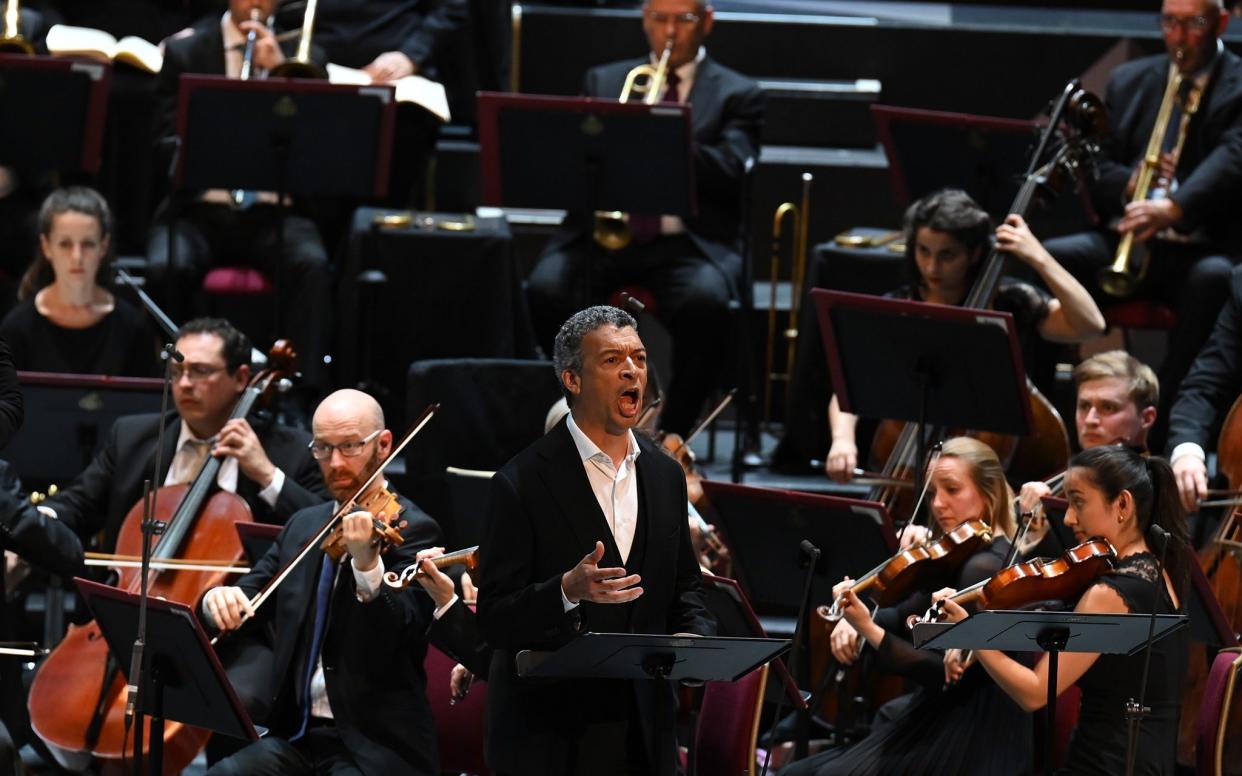
Proms 2023, Maxim Emelyanychev/Scottish Chamber Orchestra ★★★☆☆
Once second only to Handel’s Messiah in people’s affections, Mendelssohn’s oratorio Elijah dipped in popularity along with everything else from the Victorian age after the First World War. Now it’s making a tentative comeback, but as last night’s performance from the Scottish Chamber Orchestra and Chorus reminded us the piece does have its problems.
The subject-matter isn’t one of them; in fact it’s a gift. All that orgiastic screaming by the errant Israelites, in an effort to rouse their exciting new god Baal (it didn’t work). All that smiting of the priests of Baal by the prophet Elijah. “Let not a single one live” he shouts (Christian charity hadn’t yet been invented).
The problem is that Mendelssohn, bless him, wasn’t much good at music for smiting or crazed pagans. The sweetly consoling angels who visit Elijah during his desert exile were much more his line, as were the sturdy hymns sung by the faithful Israelites, which to me have always been suggestive of the Salvation Army on a mission to rescue factory workers from the demon drink.
For Maxim Emelyanychev, the Russian Principal Conductor of the SCO, this upright, chaste quality isn’t a weakness, it’s something to be cherished. And cherish it he did. It’s not often an artistic experience in 2023 could be described as “edifying”, but this was certainly one. The nobility of the music shone out, and also its intimacy. I’ve rarely heard a performance in the Albert Hall which has cultivated so many shades of ‘pianissimo’ – Emelyanychev no doubt taking his cue from the line about Jehovah speaking to his people with a “still small voice”. The balance between the huge Albert Hall organ and the performers on stage, always a tricky thing to get right, was superbly handled.
Emelyanychev was helped by five singers as sweetly English in sound and style as you could wish. When sopranos Carolyn Sampson and Rowan Pierce and mezzo-soprano Helen Charlston joined together for that angelic trio their sound was so spotless and tender you couldn’t help but be melted. Andrew Staples was nobly sincere as the priest Ahab, as was Roderick Williams as Elijah.
The trouble was one couldn’t imagine such a decent chap as Williams’s Elijah smiting anybody. And that was the problem with the performance. Apart from Charlston’s engagingly harsh sound for the cruel Queen Jezebel, it was all just too tasteful and sensitive. Wagner once described Mendelssohn’s music as a “musical temperance society”, a sneer I’ve often quarrelled with, but this performance made me think he was sometimes right. IH
Listen to this Prom on BBC Sounds for 12 months. Tickets: 020 7070 4441; bbc.co.uk/proms
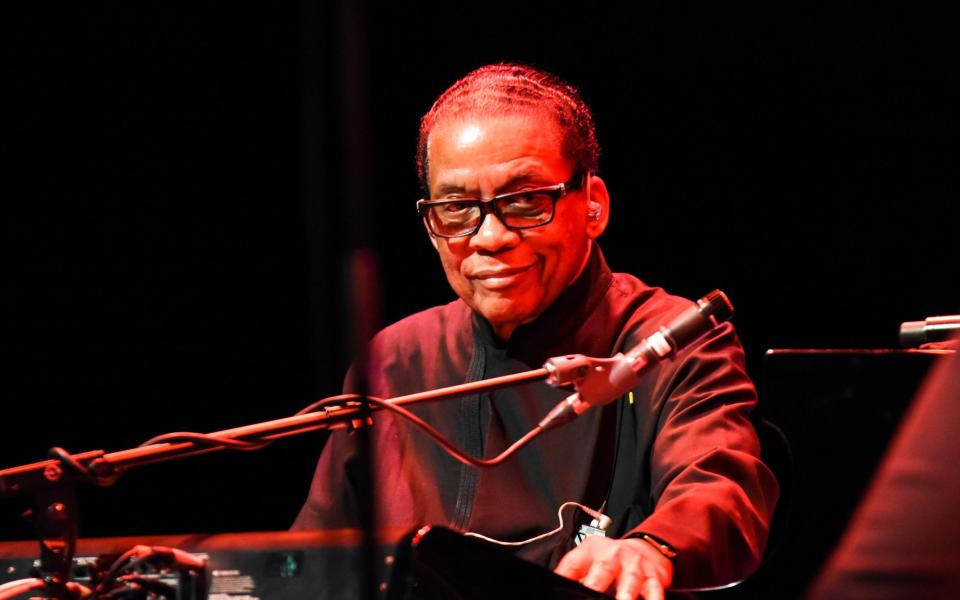
Herbie Hancock, Barbican ★★★☆☆
Very few jazz musicians can inspire a standing ovation before they’ve even played a note, but, as we were reminded last night, Herbie Hancock is one of them.
The great pianist/composer, collaborator to Miles Davis and the late Wayne Shorter as well as pioneer of 1970s jazz-funk, followed his terrific young quintet on stage to a roar of affection, with 83-year-old Hancock giving a little skip, perhaps to assure us age had not withered him.
Hancock’s back-catalogue is now so huge no retrospective gig can cover it, so instead the evening kicked off with a medley – though it actually felt more like a magical mystery tour through Hancock-land. The lights fell and we were lifted into a realm of cosmic electronic swooshes and burblings conjured by Hancock from his synthesiser, descending back to earth every now and then for a brief taste of a Hancock number before soaring up again.
It’s one of Hancock’s charms that he can combine an earthy funk feeling or a romantic ballad with these utopian futuristic yearnings, which hark back to the “Afro-futurism” that came in the wake of the civil rights movement. But frankly this succession of little fragments wasn’t a great beginning to the gig, as none of the musicians had time to establish a real presence.
Another problem which beset the evening was that, as with West End musicals, the mass of technology on stage often overwhelmed the human element. Terence Blanchard is a wonderful trumpeter, but the thrilling effect of his soaring high notes was spoiled when they continued to soar over the loudspeakers, despite us clearly seeing that he’d stopped playing some seconds ago. Both guitarist Lionel Loueke and bassist James Genus made use of the now-ubiquitous foot-pedal to create towering multi-layered soundscapes, but their predictability only confirmed my feeling that this device deserves its own special circle in hell.
Still, there were moments of real inspiration when an individual player emerged from the tumult of sound and did something brilliant. Blanchard’s solo in Footprints, the quintet’s homage to the late, great saxophonist Wayne Shorter, curved towards its close with that clinching authority only great players can muster. Genus played with extraordinary eloquence using just a few notes in Actual Proof, from Hancock’s Thrust album released nearly half a century ago. Throughout the gig drummer Jaylen Petinaud (“only 25!” said Hancock when he introduced him, shaking his head in disbelief) was a marvel of elegant funkiness, and blisteringly powerful in his solos. Only Loueke seemed to be coasting, when not impressing us with nifty pedal-work.
The musician who worked hardest on that stage however was undoubtedly the oldest. Shepherding harmonies of sultry sensuousness in Come Running to Me and coaxing heavenly voices from his electronic vocoder, Hancock brought something truly special to the evening: a sense that music can give us hope for a brighter future. For a moment, we were embraced by the optimism of a different era.
The Herbie Hancock Quintet is at the Barbican tonight barbican.org.uk
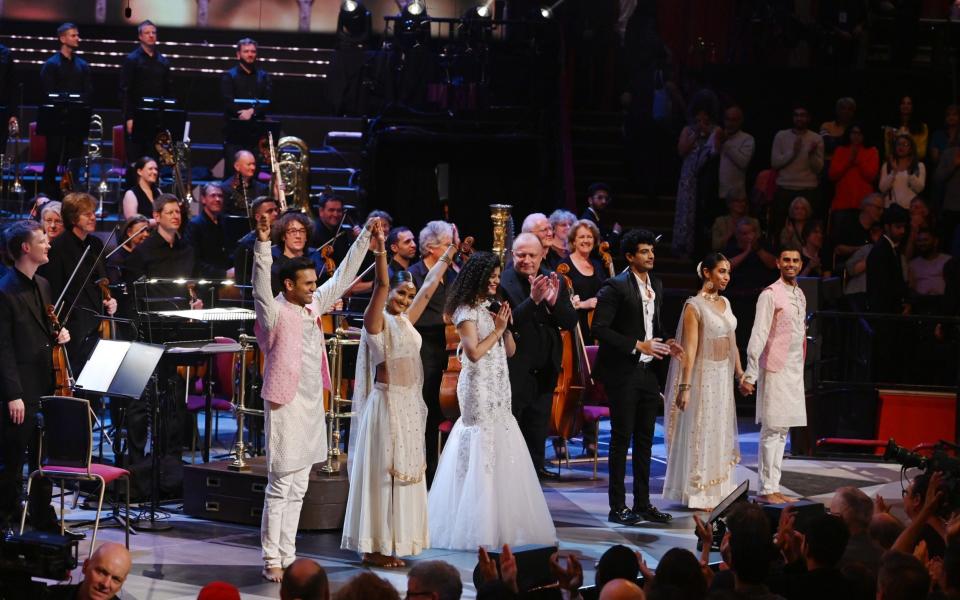
Proms 2023, Lata Mangeshkar: Bollywood legend, Royal Albert Hall ★★★☆☆
Almost 50 years after Bollywood playback singer Lata Mangeshkar became the first Indian to perform at the Royal Albert Hall, her evocative music filled the London concert hall once again – this time in a Proms tribute following her death last year at the age of 92.
It wasn’t Bollywood’s first dalliance with the Proms – that was in 2009 – but Mangeshkar’s 73-year career offered an opportunity to celebrate the musical legacy of Hindi cinema. She was known as the “nightingale of India”, one of the country’s most celebrated singers, but her influence extended far beyond: sampled by pop stars such as Britney Spears and Timbaland, she was also one of the biggest inspirations for Freddie Mercury.
Mangeshkar lent her voice to hundreds of Bollywood actresses, singing as many as tens of thousands of songs for hit films. On Friday night, the Royal Albert Hall audience – a more diverse crowd than is typically seen at the Proms – met many of these tracks with warm familiarity, from her 1949 breakthrough Aayega Aanewala and 1960s patriotic number Aye Mere Watan Ke Logo to one of her most well-known hits, Lag Jaa Gale. Mangeshkar may have been camera-shy but she was not anonymous: a beloved national figure and stalwart of Indian culture and identity, she was a household name whose voice conjures a nostalgic power for multiple generations of listeners.
And nostalgia was the most successful aspect of the night. Indian singer Palak Muchhal had the unenviable, perhaps impossible task of stepping into Mangeshkar’s shoes (though Mangeshkar in fact always sang barefoot). She was accompanied by the City of Birmingham Symphony Orchestra, conducted by Michael Seal: an arrangement that ought to have suited the songs, which often gained force and identity outside of the films they soundtracked.
While generally able to express the range of emotion present in Mangeshkar’s music – romance, yearning, flirtation, heartache – at other times the orchestra jarred with the songs, too grandiose for their subtleties, and overpowering Muchhal’s voice, which was more delicate than Mangeshkar’s versatile, characterful soprano. The arrival of four dancers on stage provided a better reminder of Bollywood’s capacity to entertain.
But neither dancers, orchestra, nor singer could recreate the magic of the original music. Worse, when Muchhal was joined by her brother for a few songs, his tuneless singing added an offensively amateurish quality to the night. It was a slightly careless tribute to a singer who deserved the very best, an evening of missed potential that lacked the spirit that made Lata Mangeshkar so cherished in India and across the world. Kate French-Morris
Listen to this Prom on BBC Sounds
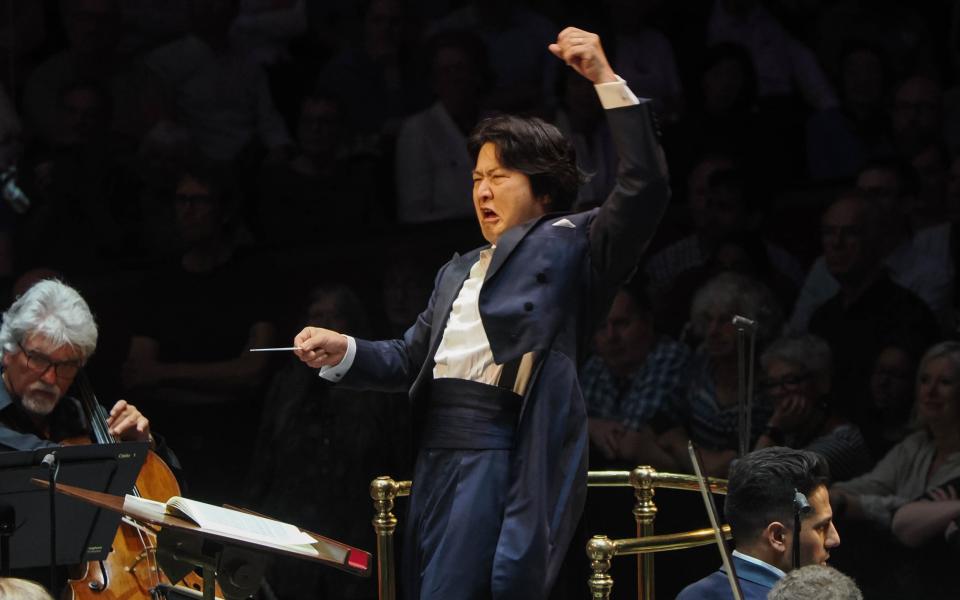
Proms 2023, CBSO/Kazuki Yamada, Royal Albert Hall ★★★★☆
A daily staple of Classic FM, exploited in numerous television advertisements, Carl Orff’s Carmina Burana has become too ubiquitous and familiar for its own good - its reputation further clouded in some circles by speculations about Orff’s behaviour during the Nazi era. I admit I reach for the ‘off’ switch if I hear it announced on the radio, but a performance as viscerally exciting as this one banishes prejudices and reminds us what a fresh, brilliant and imaginative work it truly is.
Composed in 1935-6 and using early medieval secular songs (mostly in dog Latin) as its text, it grows out of an idiom more immediate and ‘accessible’ than anything purveyed at the time by cerebral Schoenbergians or sophisticated neo-classicists. Subtlety be damned, catchy tunes and basic rhythms that could easily be mastered by schoolchildren or amateurs are the root of its aesthetic - an aim that also had profound influence on the young Benjamin Britten. This is music that means to get your feet tapping.
Under City of Birmingham Symphony Orchestra’s new music director Kazuki Yamada, it certainly did that, if my neighbours’ shoes are any evidence. But Yamada was not out to break sound barriers, and his beautifully judged reading was less notable for the thunder of ‘O Fortuna’ than for the delicate sonorities of the round dance and the naive bucolic sweetness of ‘In trutina’, sung with exquisitely pure tone by soprano Maki Mori. There was savage wit too, in the excellent baritone Germán OIvera’s ‘Ego sum Abbas’ and ‘Si puer cum puellula’, and a terrific comic turn by counter-tenor Matthias Rexroth in his rendering of the lament of a black swan that ends up roasted on a spit.
Yet exemplary as all the soloists and instrumentalists were, it was inevitably the magnificent chorus that made the most impact. Birmingham’s finest had been massed for the occasion, including youth ensembles and a university choir. Let me just say that they sang their hearts out.
A masterly stroke of programming paired Carmina Burana here with another large-scale choral work written only a few years previously - Igor Stravinsky’s Symphony of Psalms. Hieratic, austere and spiritual where Carmina Burana is playful, sensual and pagan, it is a collective act of worship set to part of the Old Testament Psalms 39, 40 and 150 in Latin translation. The CBSO’s interpretation under Yamada was impeccable, both orchestrally and chorally: precisely articulated and unsentimental, yet aglow with a solemn religious fervour that was the perfect pendant to Carmina Burana’s exuberance. Rupert Christiansen
Listen to this Prom on BBC Sounds
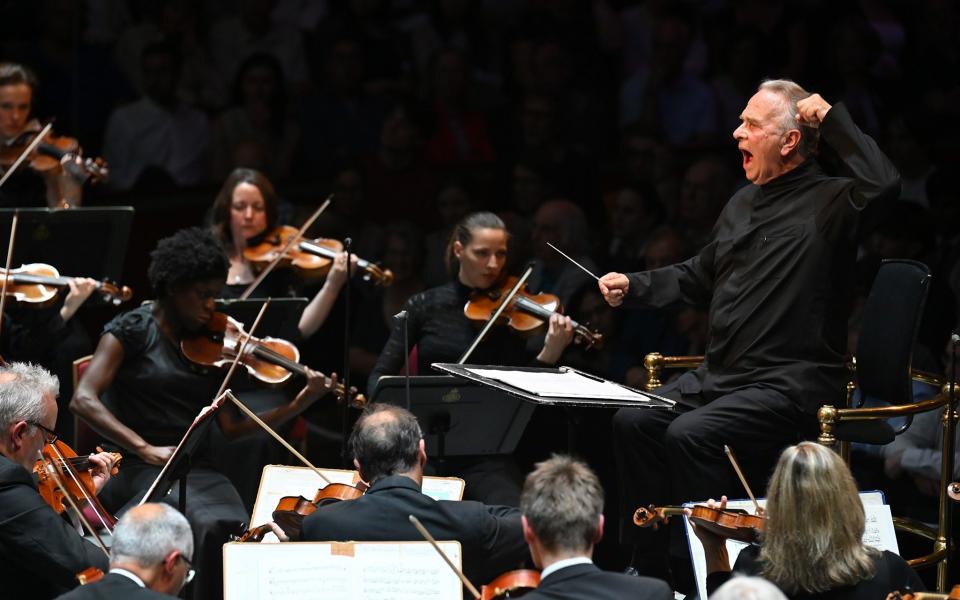
Proms 2023, CBSO/Kazuki Yamada, Royal Albert Hall ★★★★☆
A daily staple of Classic FM, exploited in numerous television advertisements, Carl Orff’s Carmina Burana has become too ubiquitous and familiar for its own good - its reputation further clouded in some circles by speculations about Orff’s behaviour during the Nazi era. I admit I reach for the ‘off’ switch if I hear it announced on the radio, but a performance as viscerally exciting as this one banishes prejudices and reminds us what a fresh, brilliant and imaginative work it truly is.
Composed in 1935-6 and using early medieval secular songs (mostly in dog Latin) as its text, it grows out of an idiom more immediate and ‘accessible’ than anything purveyed at the time by cerebral Schoenbergians or sophisticated neo-classicists. Subtlety be damned, catchy tunes and basic rhythms that could easily be mastered by schoolchildren or amateurs are the root of its aesthetic - an aim that also had profound influence on the young Benjamin Britten. This is music that means to get your feet tapping.
Under City of Birmingham Symphony Orchestra’s new music director Kazuki Yamada, it certainly did that, if my neighbours’ shoes are any evidence. But Yamada was not out to break sound barriers, and his beautifully judged reading was less notable for the thunder of ‘O Fortuna’ than for the delicate sonorities of the round dance and the naive bucolic sweetness of ‘In trutina’, sung with exquisitely pure tone by soprano Maki Mori. There was savage wit too, in the excellent baritone Germán OIvera’s ‘Ego sum Abbas’ and ‘Si puer cum puellula’, and a terrific comic turn by counter-tenor Matthias Rexroth in his rendering of the lament of a black swan that ends up roasted on a spit.
Yet exemplary as all the soloists and instrumentalists were, it was inevitably the magnificent chorus that made the most impact. Birmingham’s finest had been massed for the occasion, including youth ensembles and a university choir. Let me just say that they sang their hearts out.
A masterly stroke of programming paired Carmina Burana here with another large-scale choral work written only a few years previously - Igor Stravinsky’s Symphony of Psalms. Hieratic, austere and spiritual where Carmina Burana is playful, sensual and pagan, it is a collective act of worship set to part of the Old Testament Psalms 39, 40 and 150 in Latin translation. The CBSO’s interpretation under Yamada was impeccable, both orchestrally and chorally: precisely articulated and unsentimental, yet aglow with a solemn religious fervour that was the perfect pendant to Carmina Burana’s exuberance. Rupert Christiansen
Listen to this Prom on BBC Sounds
Proms 2023, Hallé/Mark Elder, Royal Albert Hall ★★★★☆
Since their previous annual visit to the Proms, Manchester’s Hallé and its music director Mark Elder have announced that summer 2024 will see the end of the conductor’s long and distinguished tenure there. Even then it won’t be a complete goodbye, since Elder will remain conductor emeritus, but already they seemed to be striking a valedictory note with this latest appearance at the Albert Hall: rather than the English music that has become their customary calling card, here it was an all-Russian evening of works straddling the Revolution.
A featured composer at this year’s Proms on account of his 150th anniversary, Sergey Rachmaninov considered his choral symphony The Bells (1913) to be his greatest achievement and this performance certainly supported that point of view. Rachmaninov’s fascination with bells, heard across his output, finds fullest expression in this work’s dark trajectory, and the music still speaks to our times. In the light of current events in Ukraine, the alarm bells of the third movement and funeral bells of the finale sound apocalyptic and evocative of wartime destruction, while the effervescent sleigh bells of the opening feel like a bittersweet memory.
It must have seemed so to the Ukrainian soloists, the baritone Andrei Kymach, sonorous in the slow final movement, and the tenor Dmytro Popov, coping well with the almost impossible task of riding chorus and orchestra in that tumultuous first movement. The Armenian soprano Mané Galoyan brought silvery tone to the yearning nocturne of the second movement, musing on wedding bells even as the doom-laden Dies Irae chant is invoked. The combined forces of the Hallé Choir and BBC Symphony Chorus sounded rich, not least in the wordless passages (the Russian text is otherwise based on Edgar Allan Poe) that seem to anticipate film music.
Rachmaninov’s remarkable modernity was felt everywhere in Elder’s interpretation. Drawing superbly colourful playing from the orchestra, his performance was a reminder that while the score is rooted in Russian musical tradition it also dates from the same year as Stravinsky’s Rite of Spring.
If this Rachmaninov seemed more political than usual, Dmitry Shostakovich’s Fifth Symphony (1937) felt less so: Elder played down its much-debated Stalinist contexts if not the autobiographical meaning of a work written at a time when the composer had been censured and lived in fear of a knock at the door. The scherzo sounded like Mahler in a fur hat, with Elder highlighting Shostakovich’s debt to the Austro-Bohemian composer, and the disembodied close of the third movement was beautifully done. Elsewhere, the mechanised marches packed most of their punch while not disguising a certain hollowness and banality at the centre of this symphony. John Allison
Listen to this Prom on BBC Sounds, and watch on BBC Player for 12 months.
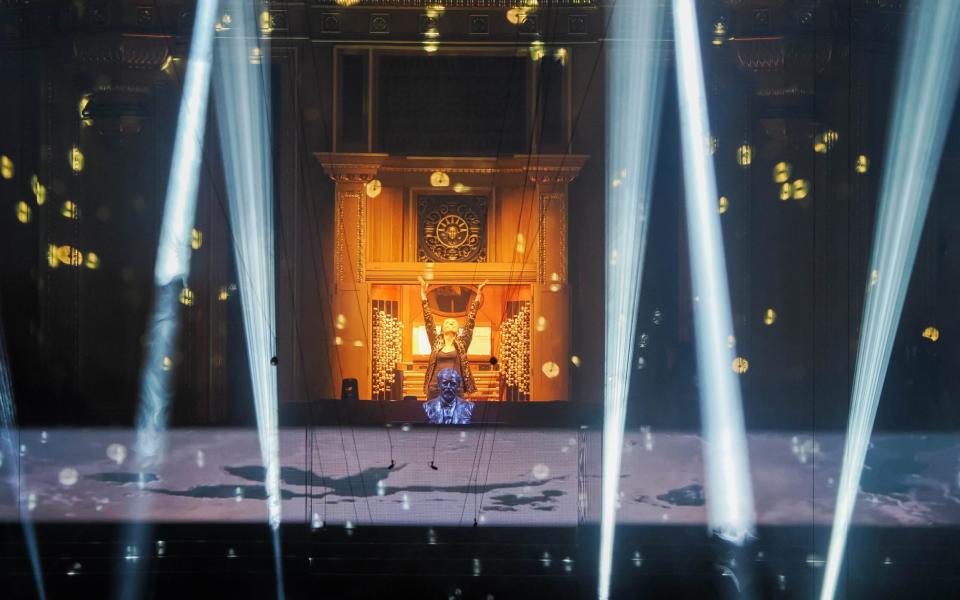
Proms 2023, Anna Lapwood, Royal Albert Hall ★★★☆☆
Fashions are circular, even when it comes to such a seemingly unfashionable genre as the organ recital. Where audiences flocked a century ago to town hall recitals featuring popular organ transcriptions, attendance more recently has sometimes dwindled to a few old men on chilly pews. But for this Late Night Prom at the ‘nation’s village hall’, 27-year-old organist Anna Lapwood – who is Director of Music at Pembroke College Cambridge and has over half a million followers on TikTok – used her social media presence to draw a packed audience for a programme well-stocked with transcriptions.
Presented under the banner of Moon and Stars and inspired by Lapwood’s fondness for the Zambian night sky, this sequence of pieces was a reminder that the organ can be good at creating cosmic effects. Lighting and video design further bathed the hall in luminescent specks, and the fans were urged to join in with mobile phone torches in the Cornfield Chase, part of the Interstellar Suite that Lapwood has arranged from Hans Zimmer’s film score.
But who knew that meandering organ music – sometimes known as ‘organists’ music’ – could be so cool? There were two default settings here, the quietly contemplative and the full-throated roar of the mighty Albert Hall organ, and both were on show in the opening piece, Kristina Arakelyan’s Star Fantasy. One of three pieces from a recent Lapwood project based on plainsong, it was followed by Ghislaine Reece-Trapp’s In Paradisum, which puts the chant up high in the pedals, and Olivia Belli’s Limina Luminis, a world premiere and the most arresting of this trio for its toccata-like effects.
Eschewing music of more substance that might still have fitted her theme (say, Marcel Dupré’s Ave Maris Stella), Lapwood played Florence Price’s quirky An Elf on a Moonbeam and two Debussy transcriptions – her own arrangement of Clair de lune working more effectively than Alexandre Guilmant’s version of the slow movement from the String Quartet in G minor. The highlight was Philip Glass’s Mad Rush, a hypnotic sequence of classic Glass gestures all seamlessly handled by Lapwood, but something is not quite right in a concert where Glass’s music is the most interesting and profound.
An organ recital, then, for those who don’t like organ recitals? Though Lapwood judged the mood for this late-night concert well, it was undemanding of the listeners and hardly demanding on the organist from a technical point of view. Maintaining such a presence on social media must be time-consuming, but putting some of that energy into more substantial work would be rewarding for everyone. JA
Listen to this Prom on BBC Sounds, and watch on BBC iPlayer for 12 months. The Proms continue until September 9
Proms 2023, BBC Symphony Orchestra/Ryan Wigglesworth, Royal Albert Hall ★★★★☆
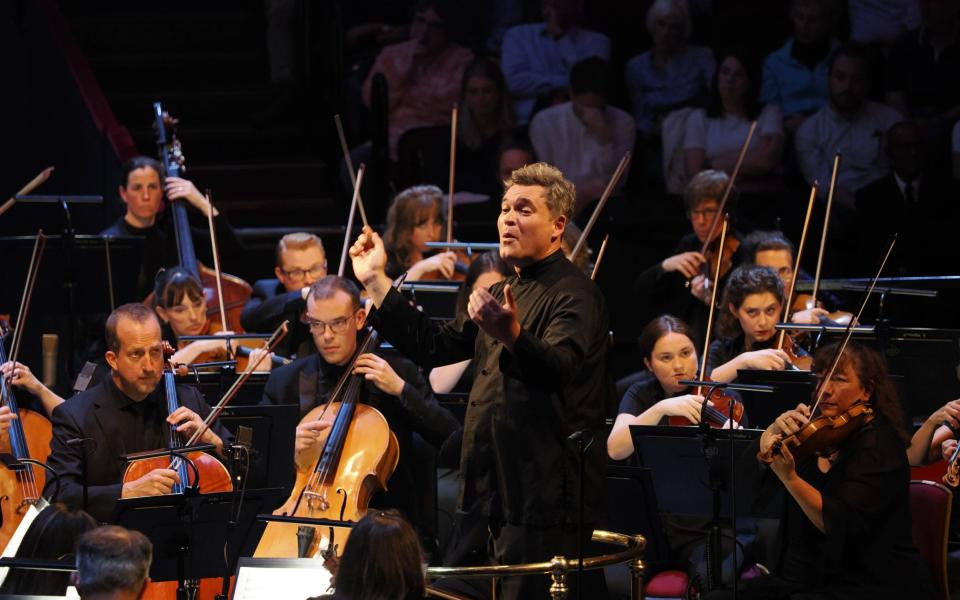
Almost as much of a Proms institution as the patriotic shenanigans of the Last Night, Beethoven’s 9th Symphony is a wonderful match in scale and spirit to the Royal Albert Hall. So it’s no surprise that performances rarely fail to elate capacity audiences with the music’s message of joyful universal brotherhood.
This year the BBC Scottish Symphony Orchestra was leading the celebration, with four vocal soloists all hailing from north of the border and Yorkshire-born Ryan Wigglesworth conducting. Theirs was a virile, no-nonsense interpretation, charged with plenty of drama: not a strikingly original or revelatory reading, but one that never faltered.
The opening was thrillingly tense, creating an anxious sense that anything could happen to the thematic material that Beethoven handles so restlessly – a dark journey with no certain destination. The Scherzo was more freshly charming, teasing in its sly anticipations of the Finale, while the Andante was taken slightly faster than is usual and seemed more like a song than a prayer in consequence. The orchestra played with distinction throughout, the strings silken, the brass and wind confident.
For the first bars of the Finale, Wigglesworth took a risk on a batsqueak pianissimo, beautifully executed by the cellos and double basses – the first tentative step towards the Dionysian abandon of the climax. The bass Michael Mofidian launched Schiller’s Ode with terrific bravado, answered by the ebullient tenor of Nicky Spence. Mezzo Karen Cargill and soprano Eleanor Dennis had less chance to shine, but as a quartet all four singers seemed to be enjoying themselves, despite Beethoven’s notoriously awkward vocal writing. The hundred strong BBC Symphony Chorus was in its element too, and with Wigglesworth happy to let rip, the excitement generated was almost hysterical.
Applause had broken out between all the movements: this did no harm between the first and second, but regrettably spoiled the wonderful transition from the Andante to the Finale.
A 15-minute first half of the concert was devoted to a new work by Helen Grime, one of the foremost Scottish composers of her generation. Meditations on Joy resonates with Beethoven’s 9th without making obvious quotation to it. Three short movements travel from passages of muffled intensity, interrupted by a triumphant thunderclap, to a light-touch Scherzo and an ascent into celestial realms, graced with cascades of woodwind and concluding in something like a lullaby, its harmonies unresolved. It’s a richly atmospheric and delicately coloured piece – Debussy a presence in its hinterland – that should be heard again. Rupert Christiansen
Listen to this Prom on BBC Sounds. The Proms continue until September 9
Proms 2023, BBC Philharmonic/Mark Wigglesworth, Royal Albert Hall ★★★★☆
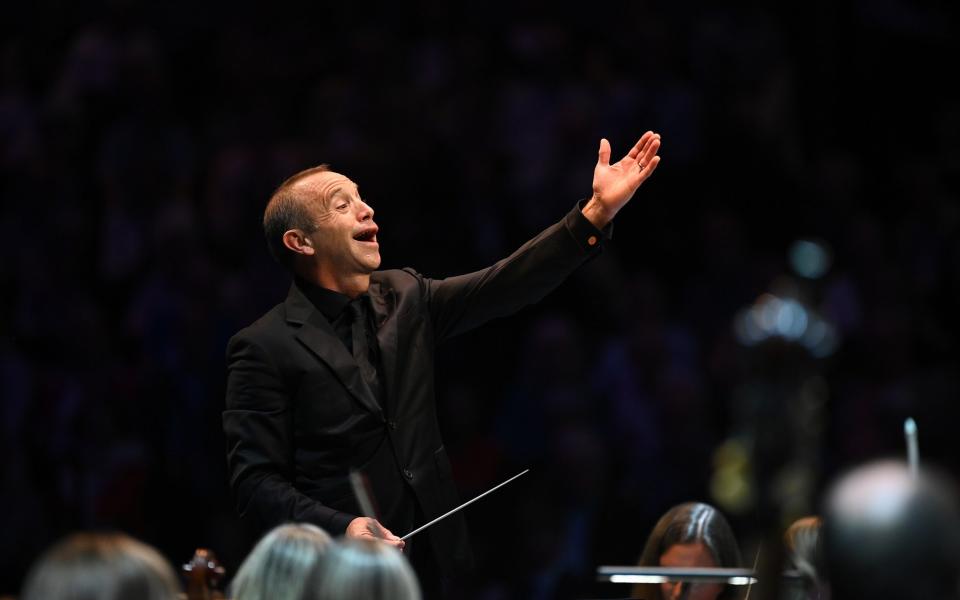
When Henry Wood co-founded the Proms in 1895, he declared he wanted to “raise the taste of the public”. No Proms director would dare say anything so appallingly elitist now, but nevertheless that aim is still often achieved, unwittingly. I imagine the Proms director never intended this BBC Philharmonic Prom to be a demonstration of how high a masterpiece soars, by putting it alongside a brilliant but flawed student effort and a so-so brand-new piece written to a BBC commission. But that is exactly what it was.
The new piece came from Grace-Evangeline Mason, who’s already enjoying a stellar career since being nominated for BBC Young Composer in 2013. Her new piece Ablaze the Moon was inspired by Sara Teasdale’s poem imagining the moon as a golden flower held in the sky’s embrace. Little repeated patterns were threaded through delicate luminous chords, while a lonely flute floated on high.
One guessed a deep bass note portending vast distances would arrive, and eventually a gentle climax suggesting the two lovers gazing at the moon, and sure enough they did, exactly in line with the composer’s programme note. It was all very beautiful, but there was nothing to seize the ear and make us think, “Ah, here’s a personal voice”.
Rachmaninov’s teenage First Piano Concerto, by contrast, was full of surprises and odd switchbacks. The only problem was that the surprises and switchbacks didn’t make much sense.
The BBC Philharmonic and pianist Stephen Hough made the best possible case for the piece, which we heard in the revised version Rachmaninov made 20 years later. There were so many delightful moments, like the one in the slow movement where Hough scattered filigree ornaments like rose petals on a slowly unfolding melody in the strings. But the piece stubbornly refused to cohere.
Finally came the masterpiece, Mahler’s First Symphony, and immediately the orchestral playing rose to a level that was truly stellar. To give just one example, the trumpeters’ melancholy, klezmer-like sound in the slow movement was so far from their lovely, far-away nobility in the first movement that it was hard to believe it was the same instrument. As for conductor Mark Wigglesworth, everything about his vision of the piece, from the unusually brisk tempo of the funeral march to his shrewd pacing of the huge finale, had the absolute stamp of authority. One felt that the masterpiece and the performance of it were eye-to-eye. IH
Listen to this Prom on BBC Sounds for 12 months. The Proms continue until Sept 9. Tickets: 020 7070 4441; bbc.co.uk/proms
Masabane Cecilia Rangwanasha and Jordan Ashman, Cheltenham Festival ★★★★☆
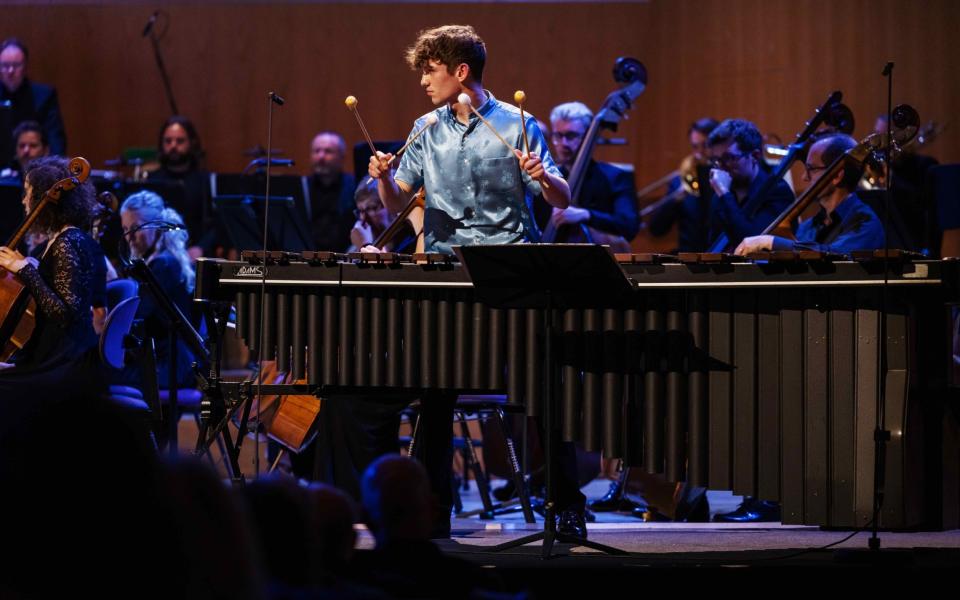
One of the joys of the Cheltenham Festival is its lavish programme of solo concerts in beautiful venues. Tuesday offered two that were interestingly contrasted, the first rooted in the primordial instinct to sing, the second in the equally primordial urge to hit a hollow object with a stick.
You might think that the first, a song recital from Masabane Cecilia Rangwanasha (rating: ****), the South African soprano who won the song prize at Cardiff Singer of the World in 2021, would easily outclass the solo percussion concert from Jordan Ashman, who won BBC Young Musician last October. The song repertoire is chock full of masterpieces, after all, and the percussion repertoire is dominated by pieces that are rhythmically invigorating and full of evocative sounds but often not much else.
In fact, it didn’t work out that way. Rangwanasha certainly has a lovely tender voice, which she floated in seraphic purity in Schubert’s Nacht und Tr?ume (Night and Dreams), and infused with urgency and longing in the same composer’s Gretchen am Spinnrade (Gretchen at the Spinning Wheel). After that, she descended to the more straightforwardly joyous territory of Jerome Kern and Frederick Loewe, leavened with some gentle yearning in South African songs of family love, and a medley of spirituals including Deep River. I wouldn’t say Rangwanasha was coasting exactly, and her easy, open-hearted generosity certainly charmed us all. But she wasn’t stretched.
By contrast, the 19-year-old Ashman stretched himself unstintingly in a programme of eight very demanding pieces, involving the mastery of a whole battery of instruments from conga drums to marimba. He’s well aware that grace is an especially important quality in a percussionist if flitting from drum to vibraphone and back isn’t to look awkward, and he also knows that the drama inherent in percussion music – sticks poised high waiting to strike – is as important as the sounds themselves.
In Mark Glentworth’s Blues for Gilbert, Ashman touched in the bluesy grace notes with nice subtlety, and in Pius Cheng’s Etude in E minor he summoned an astonishingly intense portrait of romantic pianistic virtuosity, using just four sticks on a marimba. Overall, the concert spanned a surprisingly large expressive range, from the nervy rhythmic complication of Gene Koshinksi’s Caleidoscópio to the questing, rhapsodic feeling of Anna Ignatowicz’s Toccata. Ashman’s spoken introductions may have been percussion-nerdy (“Wow, this cymbal is so cool!”), but as a player he’s already a real artist. (rating: ****) IH
Hear Masabane Cecilia Rangwanasha’s concert on BBC Radio 3 on July 19 and for 30 days thereafter on BBC Sounds
Festival runs until July 15; cheltenhamfestivals.com
Mao Fujita, Wigmore Hall ★★★★☆
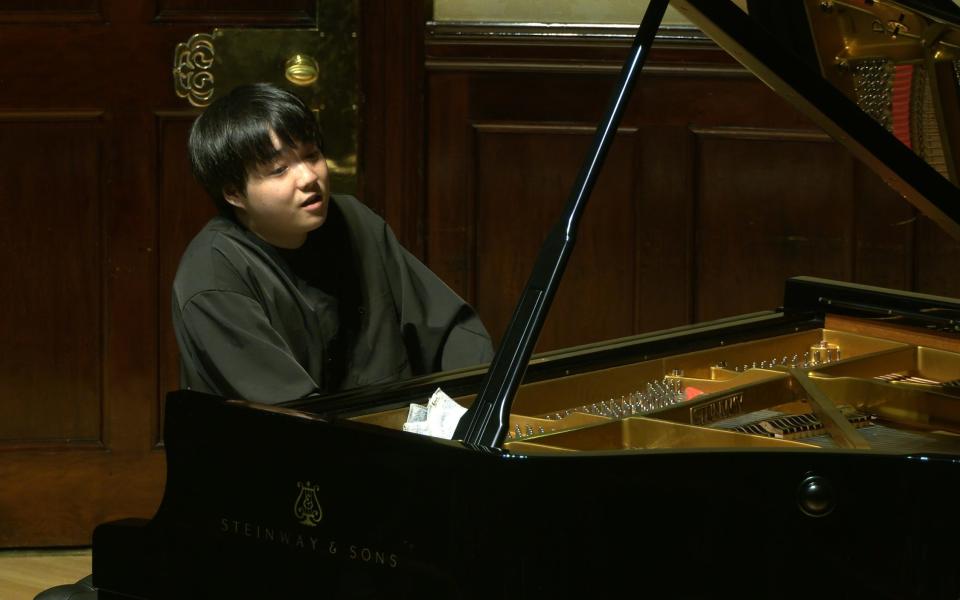
Forget electronics and mixed-media jamborees, if you really want to do something counter-cultural in the world of classical music, play a whole concert of Wolfgang Amadeus Mozart. The 24-year-old Japanese pianist Mao Fujita, silver medallist at the 2019 International Tchaikovsky Competition, is really sticking his neck out by playing all of Mozart’s piano sonatas across five concerts at the Wigmore Hall, the first of which took place yesterday.
You might say that by confining himself to Mozart, Fujita has made life easy for himself. All he has to do is aim for perfect balance and grace, string the notes like pearls, retire the accompaniment tactfully into the background, and the music will take care of itself. That was certainly true of the opening piece, the delightfully innocent 12 Variations on Ah! Vous Dirai-je Maman (known to us as Twinkle, Twinkle, Little Star). Here Fujita found a dewy perfection of sound, fortified in the closing moments by a dramatic bravura.
The other pieces were more emotionally complex, but still with that apparently simple limpid perfection, a combination which the great pianist Artur Schnabel said makes Mozart’s sonatas “too easy for children and too difficult for adults.” Fujita grasps that paradox. The inconsolably tragic Adagio in B Minor had a soft mysterious glow, very different to the stony quality many pianists give it, but equally effective. In the well-known A minor sonata, which seems to portray a scene of tragic loss, Fujita flung himself at the music with a force that was shocking, after the restraint of what had come before.
However not everything was so strong. Fujita’s winningly emotional frankness sometimes overflowed into impatience. Several times he rushed on to the next movement while the previous one was still settling in our minds, and in the slow movements of the two C major sonatas the music’s potential grandeur didn’t tell. In general, when Mozart clearly gestured towards a deeper mood, Fujita seized on it; when that mood lay half-hidden, he sometimes missed it. But still, there was much to enjoy in Fujita’s playing. Anyone who loves Mozart and beautiful pianism shouldn’t miss the chance to hear him. Mao Fujita’s Mozart series continues until 14 July at the Wigmore Hall. IH
Mao Fujita’s Mozart series continues until 14 July at the Wigmore Hall. Tickets: Wigmore-hall.org.uk
Classical Pride, Barbican ★★★★☆
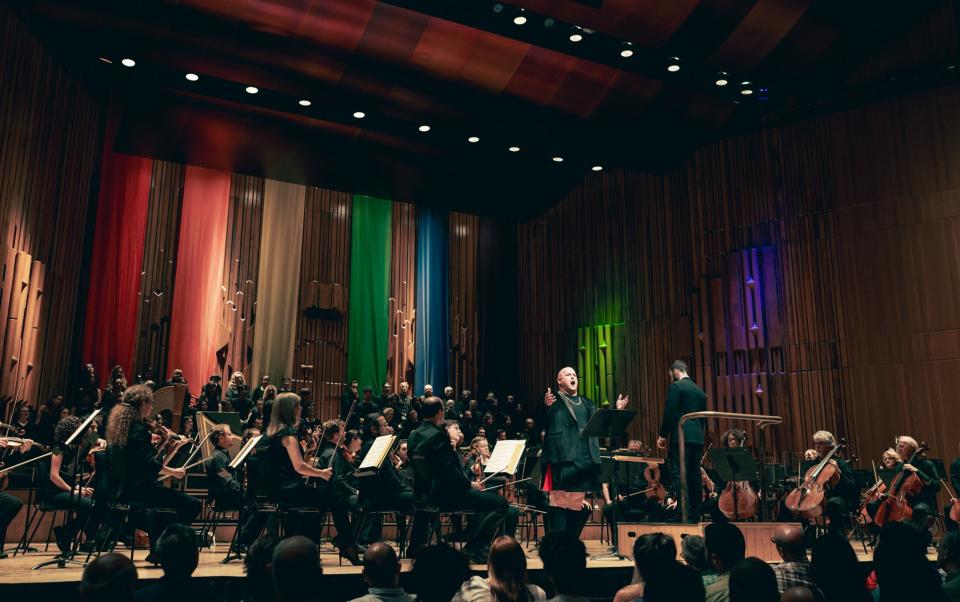
This was billed as the first-ever Classical Pride concert anywhere in Europe, which seems a surprising omission.
As we were constantly reminded, many of history’s greatest composers and performers have been gay or what we might now call gender-fluid, including Leonard Bernstein, who was described by compère Nick Grimshaw as a married man unable to express his queer identity - although Grimshaw neglected to mention Bernstein adored his wife.
Aside from the contentious assertions (was Chopin straightforwardly gay?) this was very much your typical classical concert, thus proving conductor and organiser Oliver Zeffman’s point. True, there were some unconventional hairstyles among the LGBTQ+ Community Choir, and one of the three soloists, tenor Nicky Spence, appeared in a very fetching rainbow kilt. Among the audience chaps of a certain age in lumberjack shirts and florid moustaches mingled with willowy blue-haired youngsters. But the invited orchestra, the City of Birmingham Symphony, was dressed in very sober black, as was Grimshaw – which clashed somewhat with his flamboyant manner. One felt an uncertainty of tone, traditional classical restraint fighting with Pride exuberance.
But still, the music-making, which (aside from the orchestra) featured gay or non-binary composers and performers, was generally excellent. Echoes, the brand-new setting of gay priest-poet Gerard Manley Hopkins by Julian Anderson, movingly combined a paradisal harp-and-bell incandescence with heaviness, suggesting ecstasy longed for but not yet possessed. The choir’s echoes of the eloquent, statuesque American bass-baritone Davóne Tines’s words were vividly affecting, but Tines himself was sometimes drowned out by the intensely rich orchestral sound.
The other recent piece, a setting by American composer Caroline Shaw of three poems focused on images of a red rose, was much better balanced, and each of the three soloists (Tines, Spence, and soprano Ella Taylor) seized the moment. They lent real intensity to what might have been a somewhat pallid language of delicate harp patterns and plucked string traceries.
Alongside these were two charming diversions and a proper masterpiece. The champagne of Bernstein’s Candide overture was brilliantly uncorked, and the magic of Poulenc’s concerto for two pianos, evoking Parisian naughtiness, Mozartian grace, and even Javanese court music, was beautifully caught by the two soloists, Pavel Kolesnikov and Samson Tsoy.
Finally came Tchaikovsky’s Romeo and Juliet, played with tremendous ardour and shrewd dramatic timing under Zeffman’s baton. The irony of a celebration of Pride being capped by a vivid portrayal of emphatically heterosexual love didn’t bother the audience, which stamped and whooped its approval. IH
No further performances
Maxwell Quartet/Alasdair Beatson, Spitalfields Festival ★★★★☆
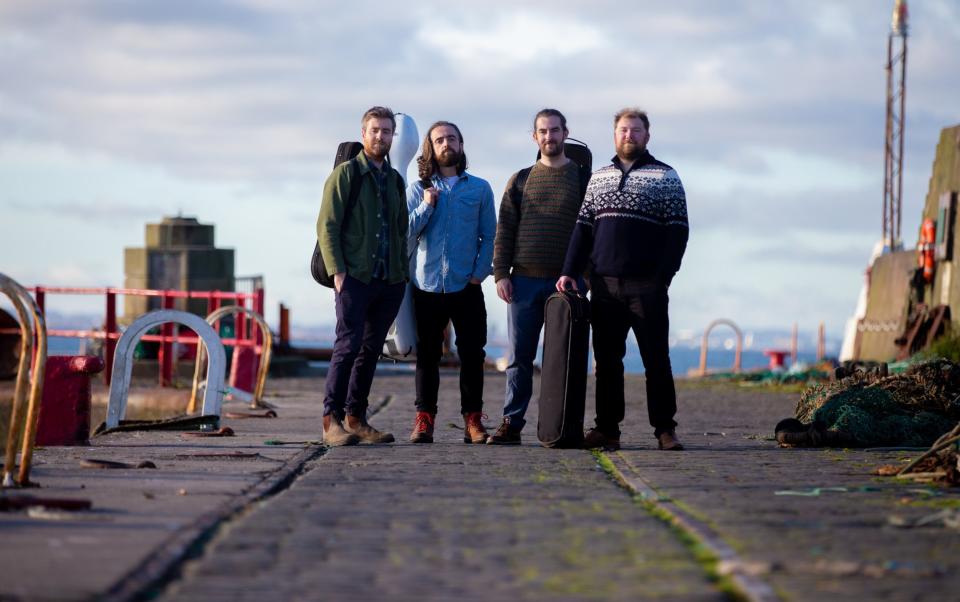
Coming from a composer as prolific as James MacMillan, it’s striking that his new piano quintet We Are Collective is his first real chamber music in almost 15 years. Choral and orchestral works have remained much more of a focus, so perhaps his style is just a little too portentous to sit naturally in such an intimate medium. This first English performance of the quintet at the Spitalfields Festival – one of the co-commissioners along with Haddo Arts, where it premiered last autumn – got an otherwise excellent concert off to a querulous start.
Arresting string fanfares are soon joined by the piano at full tilt, to clangy effect in the acoustics of Shoreditch church – no fault of either Scotland’s Maxwell Quartet or pianist Alasdair Beatson, who otherwise had the measure of the space. Reflecting how the work began as sketches for a song, the title is a typical MacMillan tease: as the programme note put it, ‘Though it may be inspired by politics, it is not a political piece.’ MacMillan is too much of a pro, of course, not to write quieter textures (especially pizzicato and staccato passages) that work expressively, and there is energetic momentum, but the overall effect is a little shouty.
Compared with MacMillan’s somewhat laboured jazz references and quotations from Scottish folk music, pieces from the Maxwell Quartet’s own ‘musical foraging project’ Gather made a more subtle impact. Their pan-Scottish sources include bagpipe-evoking drones, played with a lightness hardly associated with the traditional instruments, and a wonderful elaboration of the almost 500-year-old Mackintosh’s Lament; two reels from the Shetlands brought the exhilarating sequence to a close.
More rewarding still was the opportunity to revisit Eleanor Alberga’s String Quartet No. 2 (1994). The Jamaican-born British composer is brilliantly compact in her handling of the medium, and not a note is wasted in this demanding work that traces its techniques to Bartók yet sounds entirely individual. The first violin part especially requires musical tightrope-walking, but everyone cohered in an intense and incisive performance. It’s good news that the Maxwells are commissioning a new work from her.
It was also good to hear one of chamber music’s underplayed masterpieces, the Piano Quintet in F minor of César Franck. A passionate work probably inspired by his infatuation with the Irish-French composer Augusta Holmes, it builds spaciously around the bravura piano writing that Beatson handled with aplomb. Like Franck’s Symphony in D minor, its centrepiece is a slow movement of endless, regenerating melody, and the performers capped that with a magnificent finale of virtuosic sweep. JA
The Spitalfields Festival continues until July 12; www.spitalfieldsmusic.org.uk
